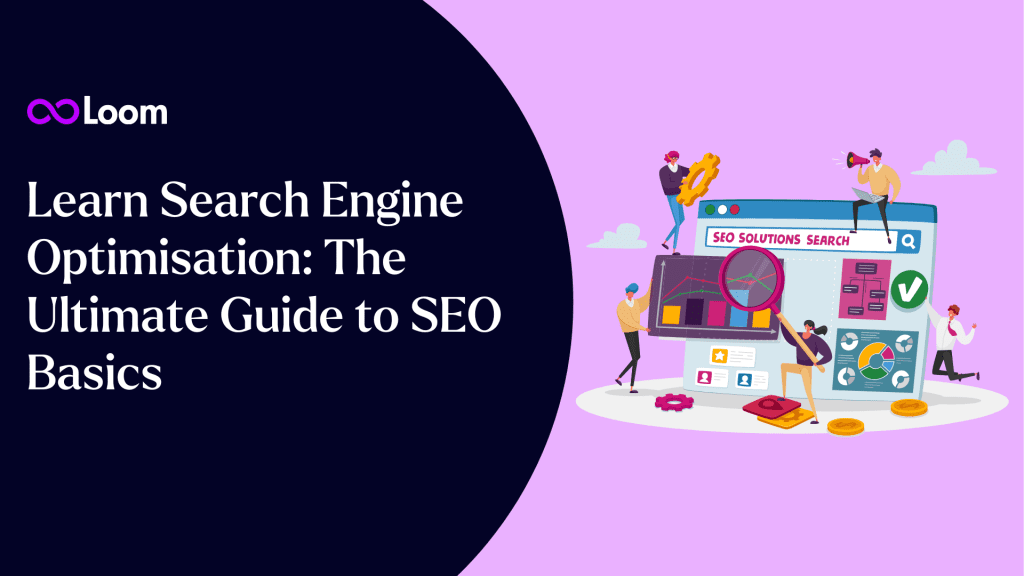Are you looking to learn search engine optimisation but don’t know where to start? You’re in the right place. This guide will walk you through the basics and provide practical steps to help you master search engine optimisation. If you’re wondering how can I learn SEO, whether you’re a beginner or looking to enhance your existing skills, this article offers actionable advice and resources to guide you on your SEO journey.
Key Takeaways
- Understanding SEO is crucial for improving website visibility, driving organic traffic, and achieving business success.
- Effective SEO practices involve keyword research, on-page optimisation, technical SEO, and off-page strategies, all aimed at enhancing user experience and search engine rankings.
- Continuous learning and utilising SEO tools and resources are essential for keeping up with trends and maintaining an effective SEO strategy.
How Can I Learn SEO?
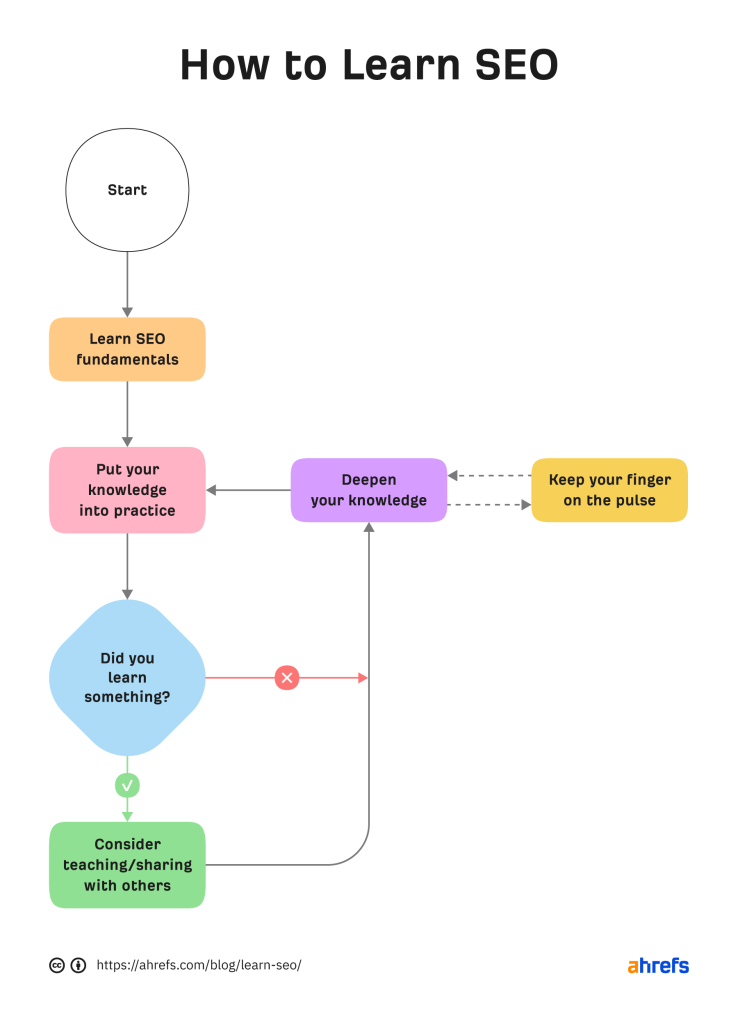
Embarking on your SEO journey can feel like setting sail into uncharted waters, but fear not! This guide is designed to be your trusty compass, guiding you through the SEO basics and beyond. Our primary focus is to introduce you to the world of search engine optimisation and provide a comprehensive overview of its value and how to achieve tangible results.
By the conclusion, you’ll grasp the core principles of SEO and its role in enhancing website traffic and visibility. Whether you’re a small business owner, a blogger, or an aspiring SEO professional, this guide will equip you with practical strategies to implement on your own, fostering self-learning and independence.
If you’re interested in exploring how SEO can drive business growth, check out our detailed guide on the benefits of SEO marketing.
SEO is not just about mastering technical aspects; it’s about creating a seamless experience for both users and search engines. A well-structured site benefits visitors by making content easily accessible, while also helping search engines understand and index your pages effectively.
Throughout this guide, you’ll master building a logical site structure, conducting keyword research, optimising on-page elements, and addressing technical SEO issues, all while monitoring performance metrics to continuously refine your strategy.
Remember, SEO is a marathon, not a sprint. It’s challenging but incredibly rewarding. With perseverance and the right knowledge, you can significantly enhance your website’s visibility, user experience, and authority. So, let’s get started on this exciting journey and unlock the full potential of SEO!
Introduction
In today’s digital age, the success of any online business hinges on its ability to be found by potential customers. This is where SEO comes into play. SEO is not just about improving search engine rankings; it’s about tracking and measuring performance, increasing visibility, and driving organic traffic to your site.
Understanding SEO can provide a significant competitive advantage. It helps you optimise your web pages for search engines, ensuring that your site appears higher in search results. This visibility is crucial for attracting more visitors, which can lead to increased engagement, conversions, and ultimately, business success.
For actionable steps to optimise your website effectively on your own, explore our guide on DIY SEO marketing.
In this guide, we’ll cover various aspects of SEO, from the fundamentals to advanced techniques. You’ll learn about keyword research, on-page and technical SEO, link building, and the tools that can help you along the way. By the end, you’ll have a robust understanding of SEO and the confidence to implement these strategies on your own.
Understanding SEO Basics
To embark on your SEO journey, it’s essential to grasp the basics. SEO, or search engine optimisation, is the practice of enhancing a website’s visibility in organic search results. This increased visibility makes it easier for potential customers to discover your offerings during their online searches, thus boosting web traffic and engagement.
Implementing effective SEO practices enhances not only your site’s visibility but also its authority and trustworthiness, which are highly valued by both search engines and users. An effective SEO strategy helps you systematically improve your site, measure results, and refine your approach based on performance metrics.
Now, let’s dive deeper into understanding SEO, starting with what it fundamentally entails.
What is SEO?
SEO, or Search Engine Optimisation, is the practice of optimising a website to enhance its visibility in search engine results. The goal is to improve a website’s relevance and authority, making it more likely to appear at the top of search engine rankings for relevant queries. Search engine optimisation seo focuses exclusively on organic search results, which are ranked based on factors like relevance, quality, usability, and context, unlike paid ads that require payment for higher rankings.
Effective SEO requires a well-structured website and high-quality content that targets relevant keywords. This means not only creating content that answers users’ queries but also ensuring that the technical aspects of the site are optimised for performance. Tools like Google Search Console can be invaluable in helping you monitor and improve your site’s SEO performance.
Focusing on search engine optimisation aims to drive organic traffic to your site, offering a sustainable and cost-effective method to attract visitors. Unlike paid search results, organic traffic continues to flow without ongoing costs, making SEO a vital strategy for long-term online success.
Why SEO Matters
SEO is crucial because higher search engine rankings lead to more traffic. This traffic is consistent and passive, making it a valuable asset for any business. Organic search traffic, which comes from unpaid visitors finding your site through search engine results, is a key indicator of the health of your SEO efforts. Enhancing your search engine rankings can attract more visitors. This influx of traffic can result in higher sales and revenue.
Beyond just traffic, SEO helps increase brand awareness by making your website more visible in search results. This visibility introduces your brand to potential customers, establishing trust and positioning your brand as an authority in your industry. High-quality, valuable content that addresses visitors’ needs and questions is essential for maximising the benefits of SEO.
Good user experience (UX) is also a significant factor in SEO success. A well-designed, user-friendly website encourages visitors to stay longer, reducing bounce rates and increasing engagement. This positive user experience can lead to more backlinks, as other websites perceive your site as a helpful resource, further boosting your SEO efforts.
How Search Engines Work
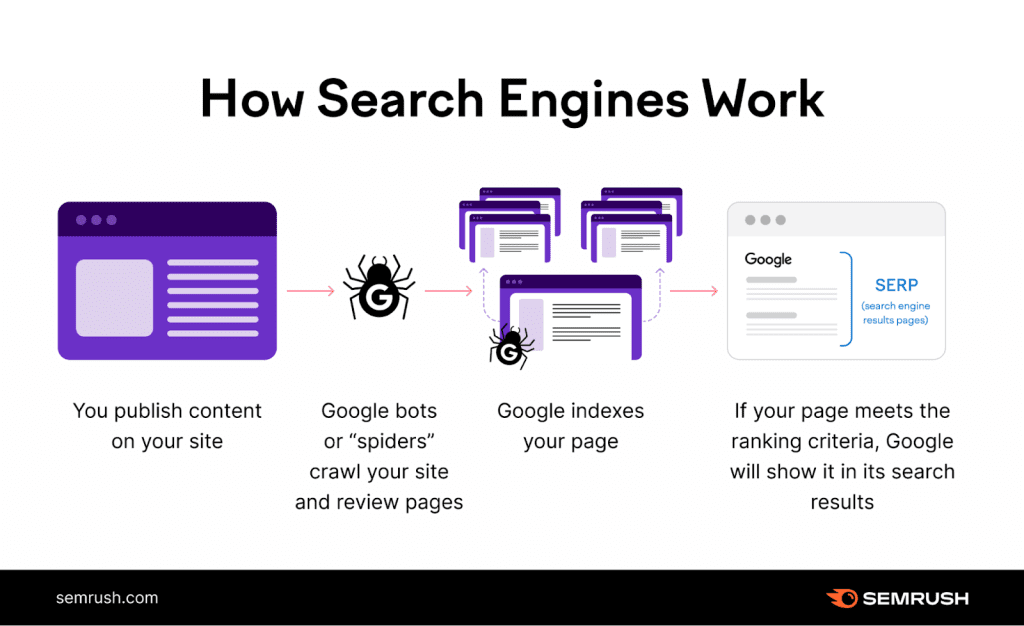
To effectively optimise your website, it’s essential to understand how search engines work. Search engines use complex search engine algorithms to manage the crawling process, indexing, and ranking of websites. The ultimate goal is to provide users with the most relevant and high-quality search results. For a page to appear in Google search results, it must be crawled and indexed, which involves scanning the internet for new or updated content and categorising it for search results.
If you’re interested in exploring technical SEO aspects like improving your website’s visibility on Google, read our comprehensive guide on how to get your website to come up on Google.
On-page SEO elements, such as content quality, HTML components, and website structure, play a crucial role in helping search engines understand and index your web pages. Google’s ranking systems evaluate relevance based on numerous factors, including location, language, and device type, ensuring that the search results are tailored to the user’s needs.
Now, let’s delve into the specifics of how search engines crawl and index websites.
Crawling and Indexing
Crawling is the process by which search engines scan internet webpages to find new or updated content. This is typically done through web crawlers or spiders, such as Googlebot. URL discovery is a key method for finding new web pages, which can be tracked through links or submitted via sitemaps. Googlebot also executes JavaScript to ensure complete data rendering, capturing all the content on a page.
Once the crawling process is complete, the next step is indexing. During indexing, Google determines if a page is a duplicate and selects the most relevant version for search results. The purpose of the search engine index is to categorise and store the crawled websites, making them accessible for search results. Submitting your site to Google can help speed up this process, ensuring your content is discovered and indexed more quickly.
Effective crawling and indexing are foundational to a successful SEO strategy. Ensuring that your website is easily crawlable and indexable by search engines will help improve its visibility in search results, leading to increased traffic and engagement.
Ranking Factors
Ranking factors are the criteria used by search engines to determine the relevance and quality of a webpage, influencing its position in search results. High-quality content that answers users’ queries is crucial for better SEO performance. Longer content, typically around 2,000 words, tends to rank better because it covers topics more comprehensively.
Backlinks are another vital ranking factor, as they signal to Google that other sites vouch for your content’s quality. A strong backlink profile, combined with high-quality content, is essential for achieving and maintaining high rankings in search engines. Both the content quality and the strength of your backlink profile contribute significantly to your site’s SEO success.
Understanding and optimising for these ranking factors can help improve your website’s visibility and attract more organic traffic. By focusing on creating valuable content and building a robust backlink profile, you can enhance your site’s authority and relevance, leading to higher search rankings and increased traffic.
Getting Started with Keyword Research
Keyword research involves finding pertinent keywords that can benefit your business. It is an essential process for optimising your content. These keywords are the terms and phrases that potential customers use when searching for products or services related to your business. The purpose of keyword research is to discover pain points and incorporate the language used by your prospects into your content. For strategies to identify the best keywords for your site and industry, check out our page on SEO methods and techniques.
Start the keyword research process by entering seed keywords. Use a keyword research tool for this task. These tools can generate hundreds of keyword ideas from a single seed keyword, helping you uncover related keywords that are relevant to your industry and improve your search result.
When selecting a focus keyword, consider factors like search volume, difficulty, and relevance to ensure that you target keywords that will enhance your visibility and drive traffic.
Finding Seed Keywords
Seed keywords are the initial terms that guide the search for additional relevant keyword ideas. These are the foundational keywords around which you can build your keyword strategy. For example, a coffee blog might start with seed keywords like ‘coffee beans,’ ‘coffee machines,’ or ‘espresso’.
The purpose of identifying seed keywords is to find related keywords relevant to your industry. Tools like Semrush can help you find these related keywords and analyse search intent. Additionally, Google offers features like Autocomplete, People Also Ask, and Related Searches for keyword suggestions, providing valuable insights into what potential customers are searching for.
You can also explore platforms like Reddit, Quora, YouTube, and forums to find new keyword ideas outside of Google. These platforms can provide a wealth of information and help you discover more keyword ideas that your potential customers are searching for.
Using Keyword Tools
Keyword research tools are invaluable for discovering and analysing keywords. Various tools, such as Google’s keyword tool, Uber Suggest, WordStream’s keyword tool, and SEM Rush, can generate helpful keyword ideas and provide useful SEO metrics. These tools have access to massive databases of keywords, offering insights into search volume, keyword difficulty, and search intent for each keyword.
Professional keyword tools provide keyword suggestions and evaluate the competitiveness of these keywords, giving users an advantage in their research. Filters in these tools help narrow down search results, making it easier to find specific keyword opportunities. Understanding factors like the authority of pages ranking for a keyword can help assess keyword difficulty and make informed decisions.
Investing in quality, paid keyword tools can save time and provide a competitive advantage, revealing potential opportunities to target. By analysing the corresponding pages and improving existing content or creating new content to target low-hanging keyword opportunities, you can enhance your site’s visibility and drive more organic traffic.
Analysing Search Intent
Understanding the user’s intent behind a search query is essential for creating content that effectively meets their needs. Search intent can be categorised into informational, navigational, transactional, and commercial investigation intents. Analysing search intent allows you to tailor your content to match what users seek, enhancing your chances of higher search rankings.
Tools like Semrush and Backlinko display the search intent of keywords, helping you tailor your content strategy effectively. By focusing on creating content that aligns with the user’s intent, you can improve your site’s relevance and authority, leading to better search engine rankings and increased organic traffic.
On-Page SEO Techniques
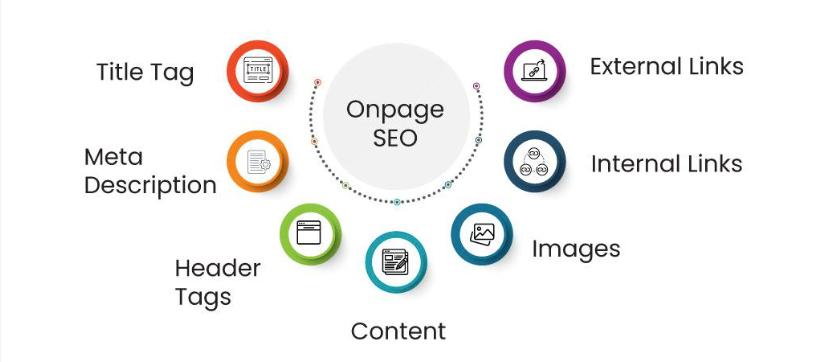
On-page SEO is the process of optimising web pages and their content for better search engine rankings. The goal is to provide perfect content and user experience while indicating the page’s purpose to search engines. Key components of on-page SEO consist of title tags and meta descriptions. Additionally, H1 tags and alt text play a crucial role as well.
High-quality, valuable content significantly enhances the effectiveness of SEO strategies. Incorporating keywords into content improves the chances of appearing in search results for those keywords. Internal linking is also crucial for building a well-structured site and improving SEO, as it enhances navigation and user experience.
Now, let’s explore some specific on-page SEO techniques.
Title Tags and Meta Descriptions
Title tags are HTML elements that specify the title of a webpage, and they are essential for SEO as they improve relevance. Including the main target keyword in the title tag is vital for improving SEO ranking. Title tags should generally be kept within 55-60 characters to ensure they display fully in search results, and the focus keyword should ideally appear at the beginning of the title tag for better performance.
Meta descriptions are HTML elements that give a brief summary of a webpage’s content, encouraging users to click. The purpose of a meta description is to attract users to click on your listing over competitors’ listings. Meta descriptions influence click-through rates by effectively summarising page content for search engine results. The optimal length for a meta description is around 960 pixels, ensuring it displays correctly in search results.
Using SERP simulators can help check title and meta description lengths to understand how they will appear in search results. A compelling meta description can greatly increase traffic by encouraging searchers to click on your listing.
Optimising Content
Optimising content involves incorporating keywords naturally into website content, which is essential for SEO. Forcing the keyword into the text should be avoided to maintain content quality and relevance. Focusing on various search intent types allows you to target different stages of the buyer’s journey, enhancing your content’s potential effectiveness.
Analysing competitors and ensuring comprehensive coverage of the topic enhances content relevance. Distributing LSI (Latent Semantic Indexing) keywords smoothly within your content can enhance relevance without falling into keyword stuffing. Frequent paragraph breaks are important for maintaining readability and keeping users engaged with your content.
By optimising your content effectively, you can improve your site’s visibility in search results, leading to increased traffic and engagement. Remember to focus on providing value to your audience while incorporating relevant keywords naturally.
Image Optimisation
Image optimisation is an often-overlooked aspect of on-page SEO, but it can significantly impact your site’s performance. Alt text, or alternative text, is text that describes an image for search engines and visually impaired users. Using alt text helps describe images, assists in SEO, and displays if the image cannot be loaded.
Image optimisation not only improves user experience but can also enhance search rankings, especially in Google Images. Using descriptive file names and alt text for images enhances accessibility and improves search engine visibility. By optimising images, you can ensure that your site is both user-friendly and search engine-friendly, leading to better overall performance.
Technical SEO Essentials
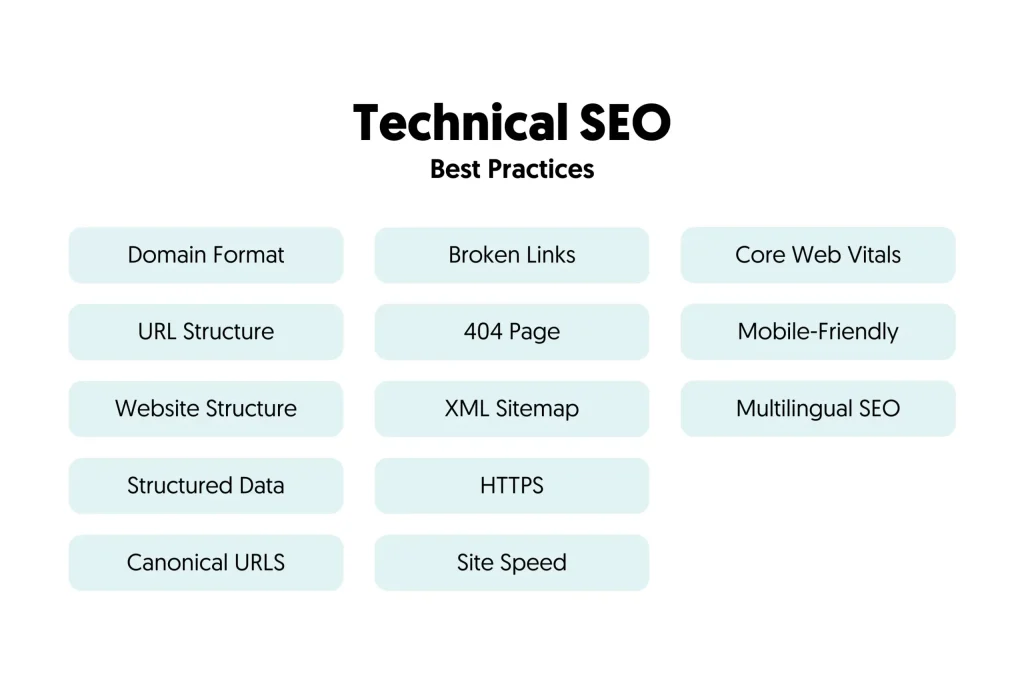
Technical SEO refers to optimising a website’s technical performance for user experience and ensuring easier discovery by search engines. The main focus of technical SEO is making the site accessible to search engines while ensuring good performance for users. Common technical SEO issues can prevent search engines from properly understanding website content, so it’s essential to address these issues to improve your site’s visibility.
An SEO site audit can help identify both on-page and technical SEO issues, providing a roadmap for improvements. Securing your site with HTTPS, optimising images, and implementing lazy loading are some of the key aspects of technical SEO that can enhance your site’s performance and search rankings.
Now, let’s delve into some specific technical SEO essentials.
Site Speed and Mobile Friendliness
Page speed is vital in SEO as it directly impacts user experience, which can influence bounce rates and conversion rates. Google uses Core Web Vitals to assess page speed, and elements like third-party scripts and server location can affect load times. Techniques to optimise for mobile include implementing a mobile-friendly theme or responsive design and utilising services like Accelerated Mobile Pages (AMP).
Mobile friendliness is crucial for SEO because more searches are conducted on mobile devices than on desktops, impacting search rankings significantly. Ensuring that your site is mobile-friendly can enhance user experience and improve your search engine rankings. By focusing on site speed and mobile friendliness, you can improve your site’s performance and attract more traffic.
Optimising site speed and mobile friendliness involves techniques such as resising images before uploading to avoid slow loading times, implementing lazy loading, and using next-gen image formats like WebP. These optimisations can significantly enhance user experience and improve search rankings, leading to increased traffic and engagement.
XML Sitemaps and Robots.txt
An XML sitemap acts as a guide for search engines to find and index important pages on a website. Submitting a sitemap via Google Search Console helps Google discover and index your site’s pages quicker, ensuring that your content is accessible to search engines. A sitemap can also provide additional information for crawlers, such as the last modified date of a page, helping search engines understand the structure and relevance of your content.
The robots.txt file informs search engines about which sections of a site should not be crawled, helping to manage the crawling process effectively. By using robots.txt and XML sitemaps, you can ensure that search engines understand which parts of your site are important and should be indexed, improving your site’s visibility in search results.
Submitting your sitemap and managing your robots.txt file are essential steps in optimising your site’s technical SEO.
HTTPS and Security
HTTPS is a secure version of HTTP that encrypts data, which is critical for improving search engine rankings. To switch from HTTP to HTTPS, you must acquire an SSL certificate, which is necessary for encrypting user data. Using HTTPS encrypts personal data and enhances security against hackers, which is essential for protecting website visitors.
To ensure your site is served over HTTPS, make sure you have an SSL certificate in place and plan a migration if your site is still on HTTP. Securing your site with HTTPS not only improves trust and security but also contributes to better search engine rankings, making it a crucial aspect of technical SEO.
Prioritising HTTPS and security enhances your site’s credibility and search visibility.
Off-Page SEO Strategies
Off-page SEO primarily focuses on activities conducted outside of your website to improve its search engine rankings. This involves acquiring quality backlinks, which demonstrate your site’s authority and value to search engines. For advanced strategies on building authority and acquiring backlinks, visit our page on SEO methods and techniques. Off-page SEO also connects with social media marketing and branding, impacting the trust and authority of your website. These external efforts significantly enhance the overall trust and authority your website holds in its market.
By focusing on off-page SEO strategies, you can build a robust backlink profile, increase your site’s credibility, and ultimately improve your search rankings.
Now, let’s delve into some specific off-page SEO strategies, starting with link building and guest posting.
Link Building Basics
The quality and quantity of backlinks significantly influence a website’s ranking on search engines. Backlinks from high-authority sites increase your chances of ranking higher in search engine results pages (SERPs). Understanding the significance of nofollow links is crucial as they can still drive traffic, even if they don’t directly impact SEO.
Guest posting is a technique where an author writes a post for another site that includes a backlink. When looking for guest post opportunities, identify high-authority blogs and websites that accept guest posts. Creating a unique and valuable piece of content, known as a linkable asset, can attract backlinks and help build a diverse backlink profile.
By maintaining a variety of link types, you can avoid penalisation and ensure long-term SEO success. A solid link-building strategy should include a mix of link types and consider factors like long-term potential, domain rating, and organic traffic. Focusing on acquiring quality backlinks and managing internal linking effectively significantly improves your site’s search engine rankings and drives more organic traffic.
Guest Posting and Outreach
Guest posting is a strategy where authors write articles for other websites to gain exposure and backlinks. To find blogs that accept guest posts, use search operators like ‘your niche’ + ‘write for us’ to filter relevant blogs. When pitching guest posts, it’s essential to align your topic with the host blog’s existing content and read their guest post guidelines.
Creating valuable content that meets the content guidelines of the host blog is crucial for successful guest posting. Incorporating backlinks within guest posts should be done naturally to maintain content quality and provide value to the readers.
Effectively utilising guest posting and outreach strategies builds a strong backlink profile, enhances your site’s authority, and improves search engine rankings.
Utilising SEO Tools

SEO tools can significantly enhance your ability to track performance and optimise strategies. These tools provide valuable insights into your site’s performance, helping you identify areas for improvement and measure the impact of your SEO efforts. Setting up Google Search Console and verifying ownership of your website are essential first steps in utilising these tools effectively.
Here, we explore some of the most valuable SEO tools, including Google Analytics, Google Search Console, and rank tracking tools. These tools can help you monitor your site’s performance, track keyword rankings, and make informed decisions to improve your SEO strategy.
Google Analytics
Google Analytics is a free tool designed for website analytics. It tracks and reports on website traffic and user behavior. Setting up Google Analytics requires inserting a special piece of code on your website, which is a straightforward process. The home dashboard of Google Analytics displays basic performance metrics, which is useful for beginners.
In Google Analytics, detailed reports can be found in the left menu, where users can analyse performance data. The All Traffic report shows the source of traffic, page performance, and spikes in traffic, while the All Pages report tracks traffic to individual pages on your website. The Landing Pages report provides insights into the top pages that people used to enter your website, helping you understand user journeys.
Combining Google Analytics with Google Search Console enhances SEO management by allowing you to measure organic traffic more effectively. Time-based metrics such as average time on page and session duration help measure user engagement on your site, providing valuable insights into how visitors interact with your content. Leveraging Google Analytics allows you to make data-driven decisions to enhance your site’s performance and drive more traffic.
Google Search Console
Google Search Console helps users monitor their website’s performance and optimise it for search visibility. By setting up Google Search Console, you can track your site’s presence in Google search results, identify issues that may be affecting your search rankings, and receive alerts about potential problems.
Key features of Google Search Console include performance reports that show the top queries and top pages, helping you understand how users find your site. You can also submit sitemaps, monitor backlinks, and track mobile usability, ensuring that your site meets the requirements for good search visibility and user experience.
By effectively utilising Google Search Console, you can enhance your site’s SEO performance and drive more organic traffic.
Rank Tracking Tools
Rank tracking tools are essential for monitoring how well your website ranks for targeted keywords. These tools provide insights into your keyword positioning, helping you assess your SEO progress and make informed adjustments to your strategy. Popular rank tracking tools include Ahrefs’ Rank Tracker and Semrush’s Position Tracking tool, which offer accurate tracking of keyword rankings and valuable SEO metrics.
Using rank tracking tools effectively can help you stay on top of your SEO efforts, identify trends, and discover new opportunities for optimisation. By monitoring your keyword rankings and making data-driven decisions, you can improve your site’s visibility and drive more organic traffic.
Learning Resources and Communities
Understanding key SEO terminology is crucial for beginners. Continuous learning and staying updated with the latest SEO trends and best practices are essential for success in this ever-evolving field. Networking within SEO communities allows you to share insights, find support, and stay informed about industry developments.
Here, we explore various learning resources and communities that keep you current with SEO trends and enhance your knowledge. From online courses and tutorials to SEO blogs and forums, these resources provide valuable information and opportunities for networking with SEO professionals.
Online Courses and Tutorials
SEO is evolving all the time, making continuous learning essential for staying current and effective. Online courses and tutorials provide structured learning opportunities that can help you grasp the fundamentals of SEO and stay updated with the latest practices. A couple of weeks is generally enough to learn the basics of SEO, but continuous learning is key to mastering advanced techniques.
Users can earn the Mangools SEO certificate by passing the SEO knowledge test, which can be a valuable credential in the industry. By investing time in online courses and tutorials, you can build a strong foundation in SEO and stay ahead of the curve in this dynamic field.
SEO Blogs and Forums
SEO blogs are crucial for staying updated with the latest trends and receiving tips from industry experts. Popular SEO blogs include Moz Blog, Neil Patel’s blog, and Search Engine Land, which provide valuable insights and practical advice on various SEO topics. By following these blogs, you can stay informed about the latest developments in SEO and apply best practices to your own site.
SEO forums provide a platform for beginners and professionals to share knowledge, ask questions, and discuss strategies. Examples of popular SEO forums are Reddit’s SEO subreddit and the Warrior Forum, where you can engage with other SEO enthusiasts and experts. By participating in SEO forums, you can gain insights, find solutions to challenges, and stay connected with the SEO community.
Networking with SEO Professionals
Networking with SEO professionals allows you to stay updated on industry trends and best practices. Engaging with experienced SEO professionals can provide guidance, feedback, and support, making your learning journey smoother. Joining SEO communities, such as forums and social media groups, facilitates knowledge sharing and fosters collaborative learning.
By networking within the SEO community, you can build valuable connections, gain insights from industry experts, and stay informed about the latest trends and techniques. This collaborative approach can enhance your SEO efforts and help you achieve better results.
Summary
In summary, mastering SEO is a multifaceted journey that involves understanding the basics, conducting thorough keyword research, optimising on-page and technical elements, and building a robust backlink profile. By focusing on creating high-quality content, improving user experience, and addressing technical SEO issues, you can significantly enhance your site’s visibility and drive more organic traffic.
For more practical tips, check out our comprehensive resources on DIY SEO marketing and how to get your website to come up on Google.
Continuous learning and staying updated with the latest SEO trends and best practices are crucial for long-term success. Utilising SEO tools, networking with professionals, and participating in SEO communities can provide valuable insights and support throughout your SEO journey.
Remember, SEO is a marathon, not a sprint. It requires patience, perseverance, and continuous effort. By implementing the strategies discussed in this guide and staying committed to learning and adapting, you can achieve remarkable results and unlock the full potential of SEO for your website.
Frequently Asked Questions
What is SEO, and why is it important?
SEO, or search engine optimisation, is crucial for enhancing your website’s visibility in organic search results. By improving visibility, it drives more traffic and increases user engagement and conversions.
How do search engines work?
Search engines operate by using algorithms to crawl and index web content, categorising it for storage. The ranking of websites in search results is then determined by various factors, including content quality and backlinks.
What are the benefits of SEO for my business?
SEO can drive traffic, enhance user experience, and boost conversions. Discover more in our article on the top 10 benefits of SEO marketing for your business.
What are some key on-page SEO techniques?
To enhance your site’s visibility and user experience, focus on optimising title tags and meta descriptions, using relevant keywords throughout your content, and ensuring images have descriptive file names and alt text. Implementing these key on-page SEO techniques is essential for effective search engine optimisation.
Why is keyword research important for SEO?
Keyword research is crucial for SEO as it identifies the specific terms potential customers use to search for products or services, allowing you to enhance your site’s visibility and attract more relevant traffic. Prioritising the right keywords can significantly impact your online presence and success.
What are some effective off-page SEO strategies?
Acquiring quality backlinks through link building and guest posting is essential for effective off-page SEO. Learn more in our guide on SEO methods and techniques.
